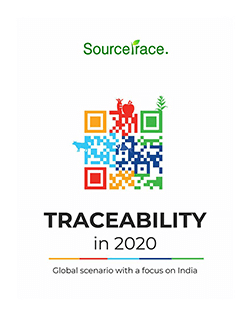Today, at SourceTrace we’re happy to share our moment of pride and fulfillment, having made it as the cover story in the Food and Beverage Tech Review.
The world is racing to meet the Millenium Development Goals, the first of which is ‘eradicating extreme poverty and hunger’. But in Africa, it’s one step backwards with the absolute number of undernourished people increasing in the last 20 years. This is true of no other place on earth. Such a scenario has unfolded despite a steady increase in agricultural production which has actually tripled in value. Yet, cereal yields remain low – at just half of what is achieved in Asia. In short, agricultural output hasn’t kept pace with the population growth, which has not just doubled during this period, but tripled in urban areas.
Agriculture is undoubtedly the most important sector of the economy in Africa because it creates most jobs. Even industrial growth can be promoted only in an environment of dynamic agricultural growth. But the main reason why it is said that agriculture is everyone’s business in Africa is because it is at the core of the continent’s food security. And food security is the key that fosters sovereignty. Food security is the strongest mechanism to combat the subservience that plagued the continent for centuries.
Look a little closer, and you see a uniqueness to the character of farming in Africa – it is dominated by small family farms (of less than 2 hectares in area), which make up 80 per cent of the total farms, more than anywhere else in the world. In these farms, the yield continues to be low; and they lack an overarching organizational structure.
The good news is that with ample cultivable land and water resources, the potential to boost production is high. But meeting the challenge of feeding Africa and reducing the dependence on international markets for food will require heavy re-investment in Agriculture. This is being backed by a couple of international programmes. The NEPAD (New Partnership for Africa’s Development) report has called 2014 the year of Agriculture in Africa – and intends to drive for food security and for Africa to become a net exporter of food. The comprehensive African Agricultural Development Programme (CAADP) seeks to increase investment in Africa in agriculture by fostering entrepreneurship and agribusiness.
This is extremely important because Africa will have a population of 2 billion people by 2050.
So, meeting the new challenge calls for training the new generations of farmers. The current training that farmers undergo is too often focused on the widespread use of one technique or on a specific training package. The trainings must focus not only on farm professions but on all professions relating to the different links in the agriculture, livestock, fishery and forestry value chains, and also in best practices so as to raise productivity. The need of the hour is also to integrate all these small farms to fit into a proper organizational structure, the operational mechanisms of which can boost productivity sufficiently.
The system of farmer’s cooperatives, which did emerge in the post-colonial era, needs to be strengthened, and so does the formation of producer organizations. As a more organized structure takes shape, improving its efficiency and transparency will become an essential requirement. This will enhance the performance of these collectives and impact the smallholder farmers. References: NEPAD report, FAO report
SourceTrace's software solutions have been deployed across 37 countries and 4 continents already. We are on a mission to make agriculture and food systems more sustainable. Get in touch and we will extend our expertise and commitment to you.

Download our new whitepaper
'Traceability in 2020: Global Scenario with a focus on India'